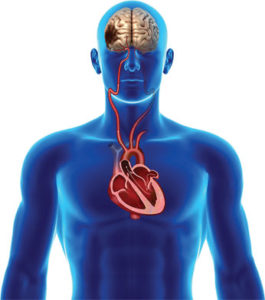 It’s estimated that between 3 and 6 million people in the U.S. have atrial fibrillation. Most of us are very familiar with symptoms of coronary heart disease, but what about the perilous condition that takes over 130,000 lives each year called Atrial Fibrillation (AFib)?1 Hereditary heart disease usually causes the disorder, but other factors that contribute to this heart arrhythmia condition are high cholesterol, high blood pressure, obesity, and heavy alcohol use, to name a few. A disruption to the top chamber of the heart, prompting the hearts rhythm and rate to fluctuate, causes an arrhythmia.
It’s estimated that between 3 and 6 million people in the U.S. have atrial fibrillation. Most of us are very familiar with symptoms of coronary heart disease, but what about the perilous condition that takes over 130,000 lives each year called Atrial Fibrillation (AFib)?1 Hereditary heart disease usually causes the disorder, but other factors that contribute to this heart arrhythmia condition are high cholesterol, high blood pressure, obesity, and heavy alcohol use, to name a few. A disruption to the top chamber of the heart, prompting the hearts rhythm and rate to fluctuate, causes an arrhythmia.
Understanding how the heart functions, can help patients better understand its dysfunction. The two sides of the heart work in opposition to each other. The right side of the heart takes in deoxygenated blood from the body and feeds them to the veins and lungs; the left side carries the oxygen and nutrient rich blood from the lungs and feeds it back to the body. Four chambers make up the heart. The top chambers are called the atria and the lower are the ventricles. Without the proper functioning, the heart will begin to cause damage to major organs, and without maintenance, your heart can cause adverse effects very quickly.
AFib Risk Factors
The risk for AFib increases with age. High blood pressure, which also increases in risk with advancing age, accounts for 14% to 22% of AFib cases.2
Additional Risk factors for AFib include:2
• Advancing age
• High blood pressure
• Obesity
• European ancestry
• Diabetes
• Heart failure
• Ischemic heart disease
• Hyperthyroidism
• Chronic kidney disease
• Heavy alcohol use
• Enlargement of the chambers on the left side of the heart
AFib increases a person’s risk for stroke by four to five times compared with stroke risk for people who do not have AFib. Strokes caused by complications from AFib tend to be more severe than strokes with other underlying causes. AFib causes 15%-20% of ischemic strokes, which occur when blood flow to the brain is blocked by a clot or by fatty deposits called plaque in the blood vessel lining.2
In AFib, the heart’s upper chambers (the atria) do not function or beat the normally. The atria pulsate very fast and erratically, with a quivering sensation. Afib disrupts the heart’s pumping mechanism, and essentially, limits the oxygen supply to the body.
Symptoms of AFib
• Dizziness
• Shortness of breath
• Racing heart
• Fluttering heart
• Palpitation
• Uneven heartbeat
• Chest pain
Clotting and Strokes
If left untreated, AFib can cause blood clots to form in the heart. These clots are produced due to a restricted pumping of the chambers, which causes the blood to pool in the atria and form clots. If the blood clots break off, they can reach the brain and cause a stroke. Patients with AFIB are 7 times more likely to have a stroke than those with normal heart rhythm.
Treatment for AFib
• Medications to regulate the heart’s rhythm (antiarrhythmic drugs, calcium channel blockers, beta blockers)
• Blood thinners to reduce the risk of stroke (Anticoagulants)
• Procedures (i.e. Catheter ablation, electrical cardioversion, implanted pacemaker, left atrial appendage closure)
• Surgery (MAZE surgery creates scar tissue is created to block the abnormal electrical impulses)
It’s critical to seek medical attention from a respected cardiologist if you are experiencing any of the symptoms related to atrial fibrillation. DO NOT wait, the heart muscle, rhythm, rate, and ability to pump correctly, is what is keeping you alive.
Dr. Laura Mosher
Laura G. Mosher, M.D., Board Certified in Cardiology & Interventional Cardiology Dr. Mosher is a trusted cardiologist, who earned her medical degree from the University of South Florida. Dr. Mosher is board certified in cardiovascular disease, interventional cardiology, nuclear cardiology and echocardiography by the American Board of Internal Medicine.
Dr. Mosher completed her residency at Wake Forest, where she was chief resident. She also completed general and interventional cardiology fellowships at the University of Florida, where she was also chief fellow. Dr. Mosher is a compassionate practitioner, who believes in educating her patients about their health for long and short term benefits.
Heart and Vascular Services
At BayCare, we treat more hearts than anyone else in Tampa Bay. In the last year alone, we helped heal more than 24,000 hearts – that’s a lot of lives. We’re here to help you and your family lead heart-healthy lives, whether that means cardiac surgery for a complex condition or you simply want to keep your numbers in check. For your convenience, BayCare features heart centers across the Tampa Bay and Winter Haven areas, ER locations with dedicated heart attack teams, multiple fitness center locations and more than 200 other access points staffed with primary care physicians, cardiologists, interventional specialists, and cardiothoracic surgeons.
Please call 1-800-BAYCARE (1-800-229-2273) or visit baycare.org.
BayCare
1-800-229-2273
BayCare.org
References:
1. January CT, Wann LS, Alpert JS, Calkins H, Cigarroa JE, Cleveland JC
Jr, et al. 2014 AHA/ACC/HRS guideline for the management of
patients with atrial fibrillation. Journal of the American College of
Cardiology. 2014;64(21):2246–80.
2. Mozaffarian D, Benjamin EJ, Go AS, Arnett DK, Blaha MJ, Cushman
M, et al. Heart disease and stroke statistics—2015 update: a report
from the American Heart Association. Circulation. 2015;131:e29–e322
Check Also
Revolutionizing Healthcare: Exploring Regenerative Medical Treatments at QC Kinetix
By Daniel Sucherman, MD In recent years, the field of regenerative medicine has emerged as …
 Central Florida Health and Wellness Magazine Health and Wellness Articles of the Villages
Central Florida Health and Wellness Magazine Health and Wellness Articles of the Villages


